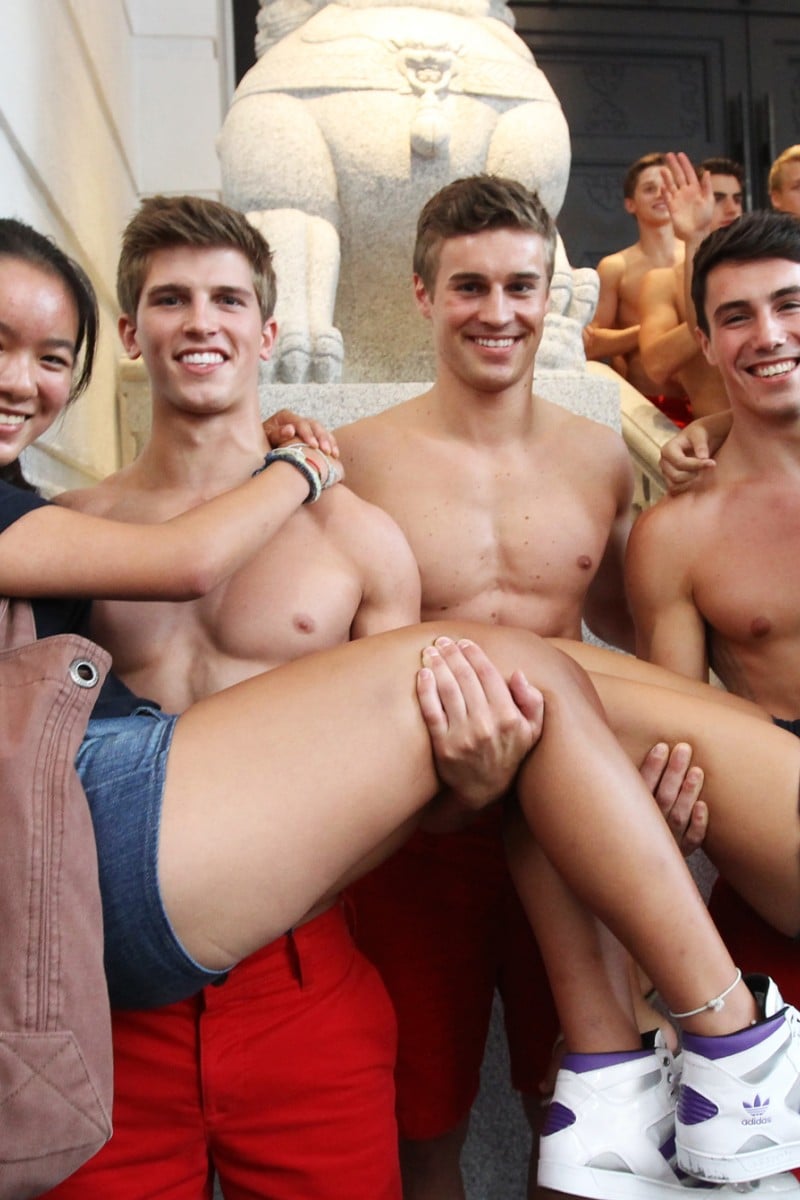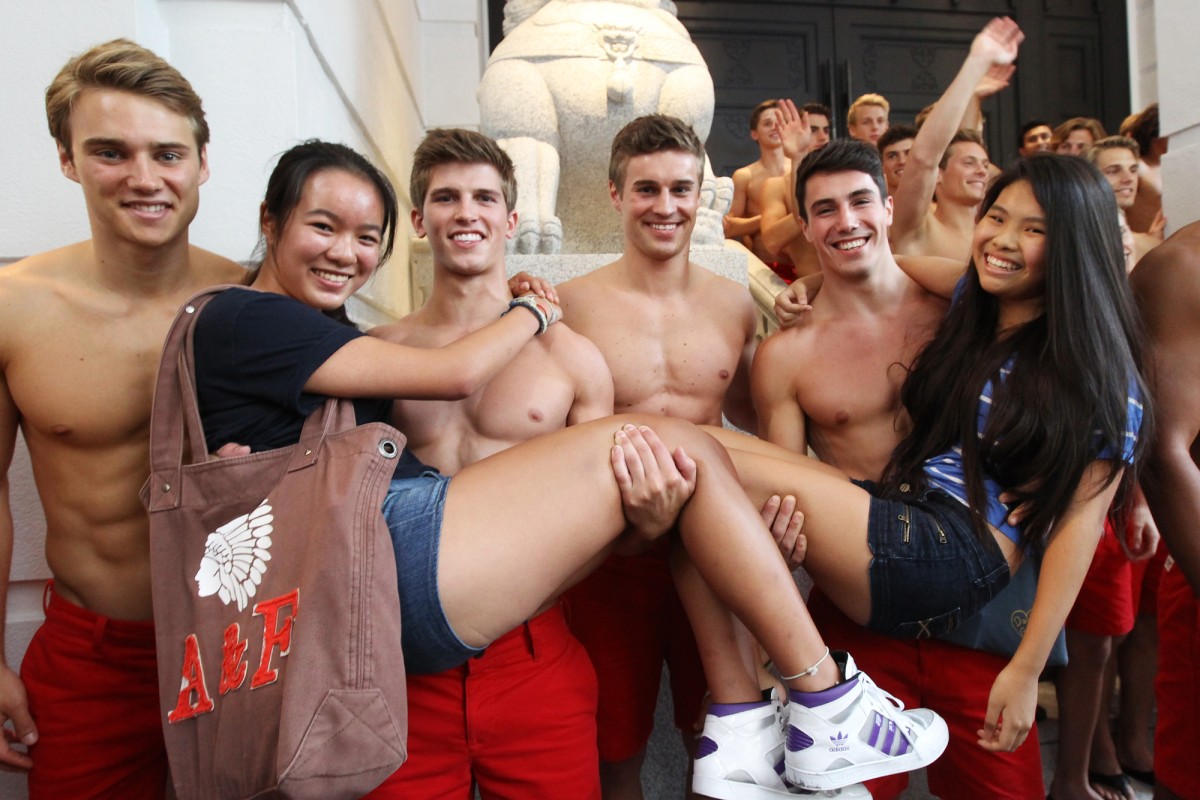
After a fashion designer caused controversy by revealing more of his male models than the audience were expecting, there has been some debate about the male image in society
 Girls pose for photographs with topless male models outside Abercrombie & Fitch.
Girls pose for photographs with topless male models outside Abercrombie & Fitch.News
In the fashion industry, it's common to see advertisements featuring shirtless men flexing their muscles. But even in an industry which flaunts the male form, nudity can still cause uproar.
American designer Rick Owens shocked audiences at his Paris fashion show in February. With outfits on display that left the crotch area exposed from the bottom of cloaks, long tunics and deconstructed tops, viewers got to see more of the male models on the runway than they had bargained for.
Opinions were polarised. While some were amused, others were outraged, inevitably bringing to question perceptions of gender and attitudes to nudity.
Guy Trebay at The International New York Times stated that "by deliberately exposing a few pendant [hanging] bits of flesh, Mr Owens seemed to be suggesting how vulnerable the basis for what we think of as masculinity is".
For Nedahl Stelio at The Sydney Morning Herald, Owens' show was simply a display of bad taste. "Only it wasn't very normal, was it? I mean, you don't get dressed and forget to put pants on, do you? Or wear a piece of clothing that has a hole placed perfectly at the crotch so the public can get a glimpse. In fact, if you were on the street you might be arrested," she wrote.
Alice Pfeiffer, a Paris-based freelance journalist, specialising in gender-related matters explained that the shock the show caused reflected deeply held gender roles in society. "Men are traditionally seen as the stronger sex, and Rick Owens completely broke with that hierarchy."
Owens defended his show. "I pass classical marble statues of nude and draped figures in the park every day, and they are a vision of sensuality - yes, but also of grace and freedom," said Owens.
"As a participant in one of our most progressive aesthetic arenas, am I not allowed to use this imagery? I would like to present a utopian world of grace free of fear and shame."
Staff reporter
Issues
Marketing
While male nudity on the runways of Paris caused a media frenzy, it was the provocative images used to advertise a new burger restaurant which sparked controversy in Hong Kong. Double D Burger in Central came under fire for their first ad campaign, which featured five women clad only in lingerie eating cheeseburgers, with the suggestive tagline: "In your mouth soon".
After complaints from activist groups, Double D took down the offending billboard and replaced it with a new campaign featuring an image of a bare-chested man holding a pixilated cheeseburger above a note: "Apparently we've been too saucy so we're blocking out the naughty bits."
The restaurant has received no complaints about this new marketing image, despite showing arguably more nudity than its previous ad. Double D Burger's marketing manager Tony Magnetic questions the accusations that the restaurant's ad objectified women, and the subsequent silence regarding the objectification of men.
"We are a team of playful men and women who love food and don't take ourselves too seriously," he says. "With this campaign we were comparing the sexiness of burgers to the sexiness of women and men … Do those people [who complain] feel the campaigns of Tom Ford and Calvin Klein also objectify women?"
Using men's bare bodies as a marketing tool is nothing new in Hong Kong. When Abercrombie & Fitch launched its flagship store in Central back in 2012, the clothing retailer brought in 110 male models who paraded topless to build hype. The half-naked men waved from double-decker buses, and posed for photos as crowds of mostly women watched them flex their muscles.
The media and pop culture, in addition to advertisements, have also had an impact on the male image in Hong Kong. With the addition of Elle Men Hong Kong and Esquire Hong Kong, there are now six magazines in the city focused on men's lifestyle.
Men's lifestyle title MRRM associate publisher Edwin Ma told Time Out that there was a growing market and demand for such focus on men and their appearance.
"Not only are there more men's publications now, but they have indeed become more liberal in showing off more sexualised Asian male images," says Ma. "We are providing a dream environment to our readers. Nowadays, sexuality does not only apply to ladies, but also to men."
Fitness
The focus on men's bodies in both media and marketing has changed the way men in Hong Kong think about their bodies, and also the way they approach their fitness goals.
Now Hong Kong advertisers show off the so-called "sunshine boy" models - men who look sporty and more muscular. King Chiu, who was a model for Abercrombie & Fitch at their opening in 2012, says that the store's launch caused a shift in how the city viewed men. "The change in my career certainly came from working at A&F," Chiu told Time Out. "During my seven years of modelling, I never had to take off my shirt as much as I did after A&F."
After A&F, Chiu released his photo book, King of V-Line, which features photos of men's buttocks and V-lines - the muscles above the groin and hips which create a V shape. The book sold out at the Hong Kong Book Fair.
"A&F caused a social media frenzy that just rippled across the city," Chiu said. "It's not like people didn't like pecs and six packs before … but now they feel like they are allowed to like them openly. It really has been because of the … influence of these companies that have affected the way people think."
Beauty centres and gyms have also seen a shift in demographic, and also demands. Mence Skin Care and Body Toning Authority owner Mence Tsoi says she sees more men now than ever before. "At first, our clientele consisted of middle-aged men that just wanted to get rid of their bellies. Now we have a large, young demographic who come in to get abs," she says.
But men are still looking for a leaner physique, says Coastal Fitness Performance Training operations manager Chris Fulton. "For the most part, new clients' first comment is they want to 'shave a few pounds'," he says.
"It is much rarer to hear someone say that they are looking to [build] muscle. I think initially people will always want to get thin and then work on building muscle after."
Health
The pressure of having an ideal physical appearance can sometimes lead to more serious health problems. While the majority of eating disorder cases are seen in women and girls, 11 per cent of patients at the Hong Kong Eating Disorders Association (HEDA) are male. And according to the National Association of Anorexia Nervosa and Associated Disorders, men are less likely than women to seek treatment for an eating disorder, as they think that such conditions are "women's diseases."
What's more, a 2008 study published in the Hong Kong Journal of Paediatrics showed that the way that teenagers perceive their body image can have detrimental impacts and lead to depression and self-esteem issues. The study, which examined students age 12 to 16 at a Hong Kong secondary school, showed that girls who thought they were overweight but were not, according to their body mass index (BMI), had increased scores for depression, and low scores for self-esteem.
Conversely, male teenagers who perceived themselves as thin were more at risk for lowered self-esteem. "Significantly lower behavioural adjustment and lower happiness and satisfaction scores were noted in male subjects who perceived themselves as 'thin' compared to those who perceived themselves as being not thin."
Such a focus on body image and media representations can lead to false expectations when it comes to fitness.
Instead of looking at models or actors, it's important to be aware of your own body and focus on health says Hong Kong University exercise physiologist Glen Joe.
"Being muscular should not be the only objective of exercise," he says. "Be realistic about your goals," Joe urges. "Although we might want to look like a certain person, genetics plays a large part in your body shape. Being healthy can be achieved with many different body shapes and sizes."
Fulton agrees. "Always aim to be healthy and feel awesome; looking awesome will then likely happen anyway."
Expectations
Recent studies have shown that men in Hong Kong not only face pressure in terms of their physical appearance, but in their expected roles in society as well. A 2011 study conducted by the Equal Opportunities Commission looked at how gender stereotyping impacted men in Hong Kong.
Through a series of surveys, seminars and personal interviews, the study showed that men often still maintain a more traditional view of their roles in society. "Firstly, most of our respondents, regardless of their backgrounds, consider paid employment the most important element in the construction of their self-identity," the study said.
"Some men even believe that harmonious family relationships can only be maintained when their income is sufficient to support a living for the family."
This financial burden on men as the "breadwinner" of the family continues to increase with the rising cost of living and lower career prospects for many men.
What's more, the study found that many men feel their identity is closely linked to how they compare themselves to women in society. "Men in general think that the distribution of power and status between men and women is like a see-saw that when one goes up, the other must go down," the study explains.
"Male respondents do think that the general rise of women's status causes the decline of men's status."
Such a competitive view of gender roles leads to problems when striving for equality. "In such an atmosphere, those men who do not meet the expectations will lose face, and have self-esteem and self-confidence damaged," the study noted.
But when men encounter such stress in their lives, they are less able to handle it and more reluctant to seek out help. "Our questionnaire survey shows that men have fewer support networks and intimate friends to turn to, and are less likely to seek help when compared with women."
Voices
"These days it's all about guys pulling their pants far down enough so we can see their V-line. I'm shy to admit it, but I do like it. V-line! V-line!"
Fan of male model King Chiu and "sunshine boys", Bonnie Cheung
"For the first time in a long time, I've seen Asian guys look more masculine. You can see that there is a little bit more strength behind them. And I think before, they didn't have that, maybe because they were shy. But now I feel a confidence."
Celebrity model and founder of agency Model One, Ana R
"In traditional advertising, when you try to sell a car, the dad would drive the car and the mum would be doing the housework. But in some countries, there is more advertising that portrays the reversal of those roles."
The Women's Foundation's chief executive, Su-mei Thompson
WORD WATCH
Depression (n)
Meaning: feelings of deep sadness or lack of self-worth
Use it: The doctors diagnosed my brother with depression and he was able to get the help he needed.
Depressed (adj)
Meaning: sad or unhappy
Use it: She's depressed today because she didn't get high marks on her exam.
Depressing (adj)
Meaning: causing feelings of unhappiness
Use it: I've heard that movie is really depressing but the actors are really amazing.
Bonus Point
50 percentage of patients aged 11-20 treated for eating disorders by the Hong Kong Eating Disorders Association Limited (HEDA)